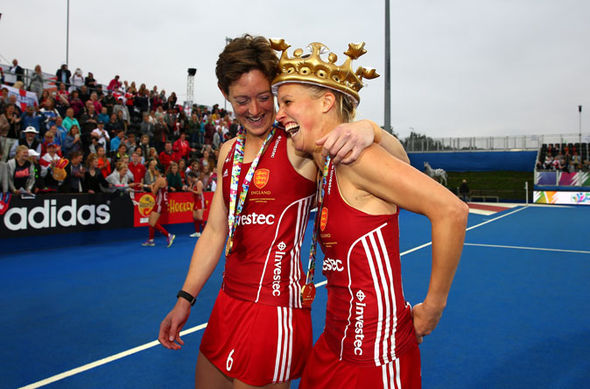Alex Danson has spent over half her life as an elite athlete playing for England and Great Britain. She has bore witness to the lowly years of English hockey and its ultimate resurgence. She has benefited from full-time funding and has won a medal in a major competition every year since 2009. An Olympic champion; now captain of her country.
Yet talent alone is not enough to succeed for the Hampshire-born 33-year-old. “You’ve got to work hard and you’ve got to love what you do.” And she has kept up this unrelenting theme since hockey first started to run through her veins.
As an 11-year-old, she would endlessly hit reverse stick shots towards the net for hours on end. Her older brother, Ed, once offered to go in goal for her on the astro turf at their local school. She’s only small, how hard can she really hit it, he thought. “After the first ball went flying past my ear I got out of the way as fast as I could!”
Four years later, Danson was playing for England under-18s. Trisha Heberle, the former Hockeyroo and England women’s coach, vividly remembers the first time she spotted Danson. Fast-tracked to the England under-21s, the Danson Express stepped up to the national team within 12 months.
“It was her attitude and determination,” explains Heberle. “She wanted to compete and attack the circle. And any opportunity she would to shoot or get herself in position, she was in it. She was physically under developed but wanted to score goals. She would be throwing herself on her stomach, diving for deflections which at that time a lot of the senior players weren’t doing.”
England always had notable strikers back then – Tina Cullen and Jane Smith to name but two. Now, a 16-year-old was joining the fray. “Often it’s something they’ve got which stands them apart, or you have to instill that quality and hunger,” adds Heberle.
“It was unusual to see such a young kid so willing and determined to get the ball and advance towards goal. She is opportunistic.”
Over a decade later and countless more internationals, Danson returned from time away from the game following bronze at London 2012.
With retirements from the Olympic campaign, Sarah Haycroft had joined the central programme. She was immediately “in awe” of Danson as she joined her new team-mates at Bisham HQ. “Even in a simple shooting drill, she was phenomenal. She is an unbelievable hockey player,” says Haycroft.
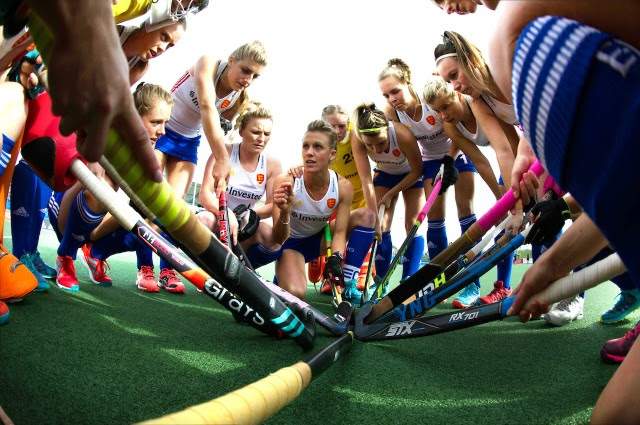
“Because she is so lovely off the pitch, to see her transform into this ruthless goalscorer is quite something.
“She throws herself into it and there is no one else who will stop her trying to score a goal. That’s how she is in the D.
“She is the epitome of an unbelievable goalscorer and will stop at nothing to put the ball in the net.”
***
Fearless on the pitch, there is a sense of freedom off it.
The Danson family have always ventured to North Cornwall for their holidays. After a mile walk to one of their favourite spots, Lundy Bay, they arrive on the turn of the tide before games of cricket, hopscotch or tennis will commence, with Alex and her brother and sister, Claire.
The ocean is the perfect tonic away from elite sport and the team environment she so relishes during the week back in Buckinghamshire.
She captained netball, threw discus for her county, but hockey was always where her strengths lay. After playing in the garden since she was six and later terrorising her brother in goal, she joined Alton HC as a 12-year-old.
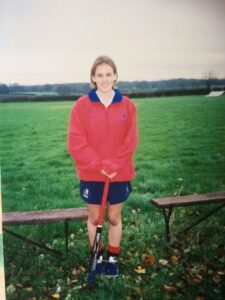
Her first coach was a volunteer. In between junior club matches, she also recalls former GB player Mandy Nicholson training the team. For months later she would practice and try to perfect the routines she learnt that day.
“Throughout my career I have been motivated, encouraged, supported and coached by so many incredible people,” she once said.
“These experiences have led me to believe it is a privilege as athletes to give back whenever we can.”
She says she learned her first lesson a year after joining Alton and being selected at England age group level. Danson was selected, she admits, not because she was the best but because she was the hardest worker. She wanted to be accepted.
“I am very competitive and I wanted to be in the England team so badly, so I put all my efforts into my training,” she said in an interview at the time.
Selection came from failure. At England under-16 trials, she had failed a bleep test and was given six weeks to prove herself before another round of trials.
There was no let up. An eager Danson admits that she woke up her parents nearly every day before school to squeeze in a run before classes. She admits that she might have been “the least talented hockey player” but had strained every sinew to show initiative to the coaches.
A couple of years later, the ever-smiling teenager was playing for Hampshire-based Trojans, away to Woking in the old Division One. At 15, she was the club’s best player.
“She played as support striker and was everywhere,” recalls Ben Barnes, a former Trojans coach. “She was completely fearless and would play like a 17-year-old boy would, with high skill levels.”
At that Woking game, she had received a call that she had been picked for the England team. There was fear and uncertainty, naturally, for someone so young. “She was self-effacing and didn’t realise how good she was in other people’s eyes,” says Barnes.
She went to her first Junior World Cup with England under-21, aged 15. Kate and Helen Richardson-Walsh were in the same side, as well as other players she looked up to. “They knew I’d be very happy to sit on the bench and learn and that’s important in a team game,” she told The Times.
Having started 2001 as a promising junior, the Hampshire schoolgirl ended the year with two senior caps to her name.
Her life was to change irrevocably thereafter off the pitch and it took her nine years to complete her BSc in open studies from the Open University. Her graduation ceremony is still “one of the best days of my life”.
On the field, she made her debut in October 2001 against Germany in Cologne to become the youngest player to be capped by England. According to her coach, she was far from “intimidated” by the experience.
And, nearly 17 years on, she still maintains the same frisson of nerves when selection nears for England or GB matches, despite her role as captain and her name rubber-stamped on the team sheet.
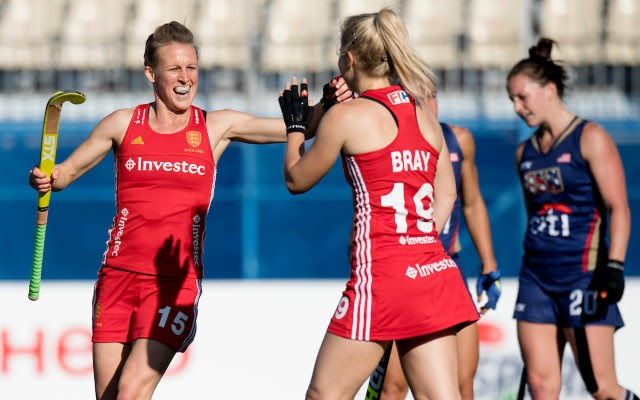
She believes that her 16-year-old self wouldn’t get into the centralised programme now. She says she was reserved and shy back then and her hockey skills wouldn’t be enough for the class of 2018, she told The Telegraph earlier this year.
But that’s perhaps the self-effacing Danson.
She has seen so much already this century and has witnessed life at Bisham Abbey evolve dramatically since she entered the national programme. England Hockey has survived financial collapse and she has seen GB women miss out on Olympic qualification.
As she kept performing for England, there have also been personal disappointments to digest. At some motivational talks for the Youth Sport Trust, Danson sometimes shows a telling photograph of her at the 2006 World Cup. She has just missed a goal that was usually a given.
The image portrays her head in her hands as the team failed to reach the semi-finals. Utter agony.
“I ask the kids if they have ever felt like giving up on something and tell them that I felt I had let myself down, let my team down and let my country down and I felt like giving up,” she told The Sunday Times in 2014.
To maintain her playing career, she continued to work as a hockey coach and at a Harvester’s restaurant in Fleet, Hampshire, before the ushering in of the central programme in 2009 and elite funding. Sixth in Beijing, bronze in London. Gold at Rio 2016. “An absolute game changer in terms of the team’s achievements,” she has said.
The previous year, she had been with the England under-21 team when it was announced that London would be hosting the 2012 Olympics. All she had thought of then was getting tickets and watching her heroes in action.
Instead it was her mother, her “hero”, and father, who watched on in London as she scored against New Zealand to help secure bronze for GB in front of a fervent crowd.
The goal was indicative of Danson’s goal-hungry persona: a dive and deflection into the net from a penalty corner routine worked over countless times at Bisham. Bronze felt like gold for Danson and co.
She took a break after London 2012 and came back for the Rio campaign in a period which changed both the team’s philosophy and the sport’s perception. In Danson’s mind, there was “more in the squad”.
“In the lead up to Rio, we spent hours and hours crafting how we could become the best team,” she told fitpro in an interview. “We had a very clear vision: ‘Be the Difference, Create History, Inspire the Future’, and a set of values: ‘We are one Team, Be Alive, We are Winners’.
“We then found ways to turn these into behaviours and live by them every single day. For example, we had a weekly session called ‘Thinking Thursday’, which was all about finding a way to win and bring our value ‘We are Winners’ to life.”
Putting the team ethos into play on the training pitch – working the players “to the absolute nth degree in terms of intensity” while finding a way to win, according to coach Danny Kerry – every player’s role and position, Danson’s included, was now valued.
The 2015 EuroHockey Championships had set them on the way. There is a striking image, pictured below, of Danson lifting the ball over the German goalkeeper earlier in the tournament.
Her opponent’s head is seemingly focused at Danson’s feet. Yet the quick-footed England forward’s muscled strength has already put away the shot and the ball is clearly visible on its way to the net.

England had come from behind in the final against the Netherlands – and then won a dramatic shoot-out. “Victory in that tournament convinced us that we could compete with the world’s best on a major stage,” she told The Times.
It was their first title in Europe’s showpiece for 28 years.
The previous year, England had finished a dispiriting 11th of 12 teams at the World Cup in The Hague. Won by the Dutch, the host nation were seen on several occasions walking together around the stadium complex in between their matches. They looked a tight and utterly formidable unit.
Now it was the turn of Danson and her team-mates in Rio as they fell into Great Britain mode. They famously came off social media and built their own fortress on the back of their team culture.
“I truly believe we were successful because we were the greatest team. Even around the athletes’ village we didn’t leave each other’s sides,” Danson told the Mail on Sunday last year. “Sixteen women walking together stand out as a pack. The Dutch are, individually, fantastic players but we were a better team.”
One team. Winners. Be alive.
Danson leads by the team’s party line.
“She wears her heart on the sleeve,” adds forward Lily Owsley. “She leads by emotion, passion and a love for the game. Her desire for us to do well is quite infectious. She plays with her heart and spreads it around the side.”
And to think the Great Britain team had little idea of the impact generated back home on that memorable Friday night in Rio as they ended the Dutch team’s Olympic domination since 2008.
“I’ll go to an event that has nothing to do with hockey and everyone tells me where they were watching the final. This moment was pure magic,” she has admitted to The Times.
Her talks continue to resonate post-2016, only this time they glisten with gold.

“I started in the same seat you are in, I had a dream of playing Hockey for my country and I did everything that I could to make that dream become a reality,” she told those assembled at the East Hampshire Sports Awards last year.
“I urge you all to do the same, you will get knock downs and times where you feel like you aren’t going to succeed, but getting through these moments are the best parts of your career and lead to amazing things.”
Yet she wholeheartedly believes that the lessons learned from playing in a team can be carried and applied to all areas of life.
“She lives to inspire the next generation; it is one of our core values,” adds team-mate Haycroft. “Her true love is the game and if she can inspire one or two people to be able to fulfill their dreams, that means so much to her.”
***
Sixteen years on, Trisha Heberle is far from surprised that Danson has now been chosen as national captain.
Having been carefully managed in both body and mind to compete at the highest level, Danson has seen through the transition. She has achieved this through an openness to continually learn.
“She is team orientated. She has this great perspective. She knows where she’s come from and the role she plays in the team.”
Heberle says there is an inextricable link with Danson’s long-time friend Kate Richardson-Walsh, who she took over from as women’s captain. “They have a genuine understanding that it’s about team work and if you get everyone functioning in their role and working hard, then anything is possible.”
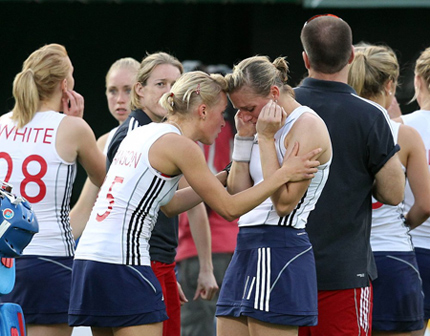
Speak to her fellow team-mates or coaches, past and present, and they will tell you that Danson refuses to take individual credit.
“Everything is about the team and how to achieve their goals as a collective,” is the general response.
An admission summed up by team-mate Anna Toman. “Not only do we step on the pitch with her, she thinks just as highly of us as we do of her. She sees us all as equal and that’s what I admire most about her.”
Individually, however, Danson has the future of English hockey at heart. She wants to introduce 10,000 primary-school-aged kids to the sport through the Alex Danson Hockey Academy, which goes into schools and sports centres up and down the country and encourages children to get active and involved with hockey.
Having had her own life transformed by the sport, Danson simply wants to give other young children the same chance.
Yet, even her daily hockey infusion has to take a backseat at times.
The sea then comes calling and the calm of sitting by the ocean.
If she had a home by the sea next to a coffee shop, then “I’d be absolutely made,” she said recently in an interview.
“She will always be busy, she will always be synonymous with that incredible night in Rio, and she will always hold a special place in the hearts of hockey fans who got to see her play the game and live out her dreams as a professional sports woman,” adds her brother.
“She will say she is the luckiest person on the planet. As her brother, I will say that she has earned it.”
So will say her team-mates – and no doubt the rest of us.
Alex is an STX player. Read more about her journey and view STX’s range of equipment
